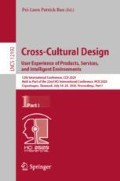Abstract
Design with value orientation and World view are increasingly the basis of envisioning the future scenarios. Exploring the value of design from the perspective of society and humanity, further guiding the direction of science and technology have gradually become one of the future development directions of human-computer interaction field. Design concepts such as design fiction and speculative design have evolved into useful tools for thinking about future directions and reflecting on the problems posed by technology. However, the current researches mainly focus on provoking thinking and developing from the perspective of criticizing reality. And has not yet formed a mature practical method which can guide the design practice. Therefore, this essay mainly discusses how to integrate the concept of Design fiction with interaction Design and service Design. Make it more conducive to promoting the innovation of existing smart products or services, and help designers generate more innovative ideas. This essay develops the content of Design fiction and forms a structured Design toolkits: Future vision generating toolkits, to guide students in teaching and research to conduct future-oriented research in the early stages of Design. After the application, the feedback is relatively successful, which also has a good guiding and promoting effect on the further design practice.
Access this chapter
Tax calculation will be finalised at checkout
Purchases are for personal use only
References
Townsend, A.M.: Smart Cities: Big Data, Civic Hackers, and the Quest for a New Utopia. W. W. Norton & Company, New York (2013)
Bardzell, J., Bardzell, S.: Humanistic HCI. HCI, p. 25, March–April 2016
Cherubini, M.: Ethical autonomous vehicles 2013–2017 [EB/OL] (2017). http://mchrbn.net/ethical-autonomous-vehicles/
Microsoft. Smart cities: enhance citizen experiences, increase sustainability and resilience, and promote innovation for your city services [EB/OL], 11 July 2013. https://www.microsoft.com/en-us/industry/government/smart-cities
Sidewalk labs. Sidewalk labs is reimagining cities to improve quality of life [EB/OL], 25 June 2019. https://sidewalklabs.com
Joi, I., Howe, J.: Whiplash: How to Survive Our Faster Future, p. 51. MIT Media Lab: via Boston Herald, 3 April 2012
Dunne, A., Raby, F.: Speculative Everything: Design, Fiction, and Social Dreaming, p. 9. The MIT Press, Cambridge (2013)
Inayatullah, S.: Six Pillars: Futures Thinking for Transforming. Foresight 10, 4–21 (2007)
Thiel, P.: Zero To One: Notes On Startups, Or How To Build The Future, p. 117. Crown Business, New York (2014)
For more on this, see Joseph Voros, “A Primer on Futures Studies, Foresight and the Use of Scenarios,” Prospect, the Foresight Bulletin, no. 6, December 2001. http://thinkingfutures.net/wp-content/uploads/2010/10/A_Primer_on_Futures_Studies1.pdf. Accessed 21 Dec 2012
Dunne, A., Raby, F.: Speculative Everything: Design, Fiction, and Social Dreaming, p. 12. The MIT Press, Cambridge (2013)
Wright, E.O.: Envisioning Real Utopias, pp. 25–26 (2010)
Huss, W.R.: A move toward scenario analysis. Int. J. Forecast. 4(3), 377–388 (1988). https://doi.org/10.1016/0169-2070(88)90105-7
Dunne, A., Raby, F.: Speculative Everything: Design, Fiction, and Social Dreaming, p. 15. The MIT Press, Cambridge (2013)
Simon, H.A.: The Sciences of the Artificial, 3rd edn, p. 157. MIT Press, Cambridge (1996)
Bleecker, J.: Design Fiction: A Short Essay on Design, Science, Fact and Fiction. Near Future Laboratory, p. 49 (2009)
Tamenbaum, J.: Design fictional interactions: why HCI should care about stories. HCI, p. 22, September–October 2014
Zhong, X.: Internet-of-Things Crisis Management. Delft University of Technology Faculty of Industrial Design, CE Delft (2015)
Schoemaker, P.J.H.: Multiple scenario development: its conceptual and behavioral foundation. Strateg. Manage. J. 14(3), 193–213 (1993). https://doi.org/10.1002/smj.4250140304
Gausemeier, J., Fink, A., Schlake, O.: Szenario-Management: Planen und Führen Mit Szenarien. Hanser Fachbuch, Munich (1996)
Evans, M.: A design approach to trends and forecasting. In: Durling, D., De Bono, A., Redmond, J. (ed.) Proceedings of Future Ground, Design Research Society International Conference, p. 7. Monash University Press, Melbourne (2004)
Ritchey, T.: Wicked Problems—Social Messes: Decision Support Modelling with Morphological Analysis. Springer, Berlin (2011). https://doi.org/10.1007/978-3-642-19653-9
Watson, R.: Mega trends and technologies 2017–2050 [EB/OL] (2017). https://www.nowandnext.com/PDF/Mega%20Trends%20and%20Technologies%202017-2050%20(Web).png
World business council for sustainable development. Pathway toward a sustainable 2050 [EB/OL], 16 December 2010. https://www.wbcsd.org/Overview/About-us/Vision2050/Resources/WBCSD-s-cornerstone-Vision-2050-report
Acknowledgements
The images used in this essay are from the works of students majoring in information design of Tsinghua University, and the feedback on the use of toolkits is from the students who participated in the interaction design course in 2020. We would like particularly to acknowledge all the members of the Interaction Design Course, along with He Xue, Zhao Zhexi, Lv Jiayi, Wang Jing, Wang Ke, Li Xiangyang, Yang Bolin, Zhou Wenxin, He Jiayi, Peng Chengyang, Zheng Zhi, Niu Yixuan, Xiang Chenzhuo and Li Hanxuan. Expressing our sincere thanks to their works.
Author information
Authors and Affiliations
Corresponding author
Editor information
Editors and Affiliations
Rights and permissions
Copyright information
© 2020 Springer Nature Switzerland AG
About this paper
Cite this paper
Fu, Z., Zhu, L. (2020). Envisioning the Future Scenario Through Design Fiction Generating Toolkits. In: Rau, PL. (eds) Cross-Cultural Design. User Experience of Products, Services, and Intelligent Environments. HCII 2020. Lecture Notes in Computer Science(), vol 12192. Springer, Cham. https://doi.org/10.1007/978-3-030-49788-0_4
Download citation
DOI: https://doi.org/10.1007/978-3-030-49788-0_4
Published:
Publisher Name: Springer, Cham
Print ISBN: 978-3-030-49787-3
Online ISBN: 978-3-030-49788-0
eBook Packages: Computer ScienceComputer Science (R0)

